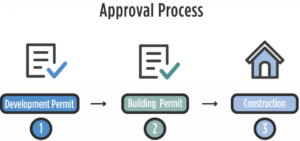Permit requests for new development have reached 1.55 million for cities and counties across the country, according to the US Census Bureau, the highest reading in five months. A community’s development includes permitting, design, and construction, which often brings new jobs and places to live, work, shop, and play. But the local community may suffer when a city doesn’t address its permit process bottlenecks. Or worse, you may lose potential economic investments to another city.
Permitting is a critical governmental function – one that generates many resident complaints. Economists estimate that the US needs another 5.5 million housing units as we only build 1 million units per year, so demand for development permits is here for the foreseeable future.
How Can We Address This?
If you are facing challenges related to increased permitting demands, there are ways to address the situation. We recommend the following:
Scale staffing levels to demand
Many local governments, fearful of spending increases, have limited budget growth to levels that cannot meet the demand for timely development permits. Restraint is reasonable, but not at the cost of economic growth. Scaling staff to meet demands can ensure that development projects are processed efficiently, safely, and in a manner that supports economic growth and prosperity.
Review your permitting processes to identify and remove any bottlenecks
Chokepoints in permit processes can cause significant delays and create inefficiencies in operations. These delays can result in increased costs, lost revenue, missed opportunities, and reduced productivity. Fixing and streamlining these processes can fuel economic growth and set municipalities up for success.
Ensure that your processes are aligned with your systems
When a city’s work is aligned with its systems, it can help to optimize processes, improve decision-making, and reduce waste. For example, are applicant instructions on websites current? Are the instructions clear? Do reviewing agencies use the same permitting platform, and if not, are the different products consistent? Have you pushed work to electronic platforms and reduced the use of hardcopy documents? Have you customized the system to the point where it does not work as designed? Addressing these concerns can help alleviate administrative burdens and process inefficiencies.
Engage with the industry/local community to understand their needs
Communication between cities and businesses in the community is important for promoting economic growth, fostering innovation, and ensuring that policies and regulations are responsive to industry needs. It can also lead to collaboration and job creation, benefiting both the public and private sector. How aligned is your opinion of service quality and timeliness with that of the community you serve? What needs improvement?
Set fees that accurately cover the cost of your services
Tax dollars are usually in short supply. That may hamstring efforts to fund better service. Cities should set fee prices to ensure they have the necessary resources to provide quality services to their residents and businesses. When fees are set too low, it can result in budget shortfalls and a lack of resources to fund essential services adequately.
MGT is here to help
Here at MGT, we have partnered with both large and small municipalities to help them enhance and customize their processes to foster efficiency. If your municipality is experiencing growth, reach out to our our management experts to ensure your processes are up to par.

